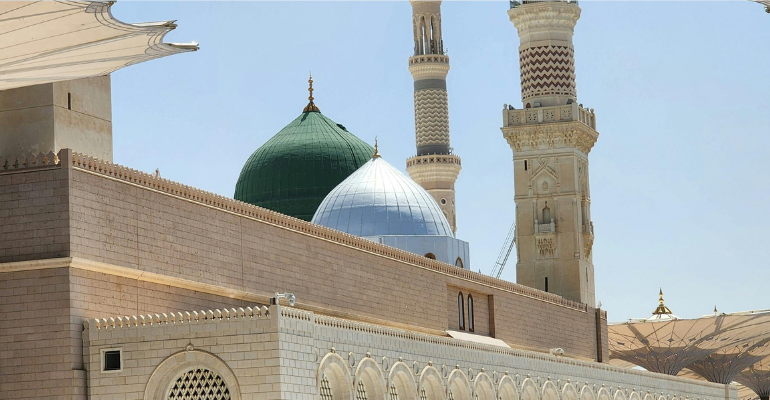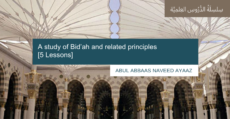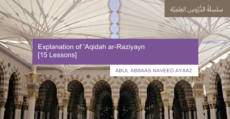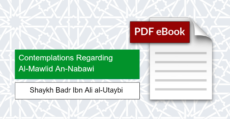In the name of Allāh, ar-Raḥmān (the most merciful), ar-Raḥīm (the bestower of mercy).
All praise is for Allāh; may salutations of praise and peace be upon our beloved Prophet, his Companions and followers.
The Prophet ﷺ informed us that some Muslims would begin to follow the ways of Jews and Christians. He said:
Surely, you will follow the ways of those nations who were before you, so much so that even if they entered a hole of a lizard, you would enter it.
They said, “O Messenger of Allāh, do you mean to say that we will follow the Jews and the Christians?”
He replied,
Who else [other than them]? [1]
Out of their love for Jesus (Eesa), the Christians introduced festivals (Eids) by specifying the 25th of December as his birthday and celebrating it annually – despite the absence of any basis in the scriptures.
Unfortunately, around 400 years after the Prophet’s ﷺ death, some Muslims, out of their love for him, designated the 12th of Rabīʿ al-Awwal as his birthday. They then transformed it into an annual festival, calling it ‘Eid al-Mawlid’—despite there being no basis for this in the Qur’ān, Sunnah, or the practices of the Companions. The Prophet ﷺ and his Companions never specified or celebrated his birthday; it was never part of Islām. Therefore, this practice is rightly termed a bid‘ah. [2]
This innovation, ‘Eid al-Mawlid,’ is not only without legislation in Islām but is also historically uncertain. We cannot assert with certainty that the Prophet ﷺ was born on the 12th of Rabīʿ al-Awwal, as Muslim historians have recorded differing opinions regarding the actual date of his birth. By the permission of Allāh, this article will present some of these views and demonstrate the historical invalidity of specifying the 12th of Rabīʿ al-Awwal as the Prophet’s ﷺ birth date.
The difference of opinion with regards to the Mawlid. [3]
1. 1st of Rabi’ al-Awwal: Mentioned by Muḥammad ibn Muḥammad ibn Munhad, in “Itḥāf al-Warā”.
2. 2nd of Rabi’ al-Awwal: Mentioned by Ibn Sa’d, in “at-Tabaqāt”; Ibn Kathīr, in “al-Bidāyah wan-Nihāyah”; and az-Zarqānī, in “Sharḥ al-Mawāhib”.
3. 8th of Rabi’ al-Awwal: Mentioned by Ibn AbdilBarr in, “al-Isti’āb”; Ibn Ḥajr al-Haytami, in “Sharh Matn al-Hamziyah”; and al-Qastalānī, in “al-Mawāḥib al-Lādaniyyah”.
4. 9th Rabi’ al-Awwal: Mentioned by ash-Shiblī an-Nu’mānī in “Sīrat un-Nabī”; Sayyid Sulaymān al-Māṣufūrī, in “Raḥmat ul-‘Ālamīn” and also Ṣafi ur-Raḥmān al-Mubārakfūrī in “ar-Raḥīq al-Makhtūm”.
5. 10th Rabi’ al-Awwal: Mentioned by Al-Wāqidī in “Tārīkh”; Ibn Kathīr in “al-Bidāyah wan-Nihāyah”; and Ibn Sa’d in “at-Tabaqāt”.
6. 11th Rabi’ al-Awwal: Mentioned by Ibn al-Jawzī in “al-Muntaẓam”.
7. 12th Rabi’ al-Awwal: Mentioned by Ibn Hishām in “as-Sīrah an-Nabawiyyah”; Ibn Ḥibbān in “ath-Thiqāt” and al-Bayhaqi in “Dalāil an-Nubuwwah”.
8. 17th Rabi’ al-Awwal: Mentioned by Ibn Kathīr in “al-Bidāyah wan-Nihāyah”, from Ibn Daḥiyyah as a view of some Shia historians.
9. 18th Rabi’ al-Awwal: Mentioned by Ibn Kathīr in “al-Bidāyah wan-Nihāyah”, as the view of the majority of historians; also mentioned by Muḥammad Ḥusayn Haykal who narrated it from Ibn Isḥāq in “Ḥayātu Muḥammad “.
10. The first Monday of Rabi’ al-Awwal: Mentioned by Ibn AbdilBarr in, “al-Isti’āb”; and Ibn Sayyid an-Nās in “‘Uyūn al-Athar”.
11. 18th Ramadān: Mentioned by Ibn Kalby and also Zubayr ibn Bakkār as narrated by Ibn Ḥajr in Fatḥ al-Bārī”; also mentioned by Ibn ‘Asākir in “Tārīkh ad-Dimishq”.
12. Before the Year of the Elephant by 15 years: Mentioned by Ibn Kalby, narrating from Abu Ṣāliḥ, upon the authority of Ibn Abbās.
13. There are ten years between his birth and the Year of the Elephant: Mentioned by Ya’qūb al-‘Atamy, upon the authority of Ja’far ibn Abī al-Mughīrah.
14. The month of Muḥarram: Mentioned by Muḥammad Ḥusayn Haykal in “Ḥayātu Muḥammad”.
15. The month of Safar: Mentioned by al-Qastalānī, in “al-Mawāḥib al-Lādaniyyah”; and .al-Qastalaanee [in al-mawaahib] and Muḥammad Ḥusayn Haykal in “Ḥayātu Muḥammad”.
16. The month of Rajab: Mentioned by Muḥammad Ḥusayn Haykal in “Ḥayātu Muḥammad”.
17. Rabee’ al-Aakhar: Mentioned by al-Qastalānī, in “al-Mawāḥib al-Lādaniyyah”.
18. The day of the Elephant: Mentioned by Ḥajjāj ibn Muḥammad upon the authority of Ibn Abbās, in “as-Sīrah an-Nabawiyyah” of adh-Dhahabī.
Conclusion
Eighteen opinions have been mentioned above, some stronger than others, clearly demonstrating the historical inaccuracy of specifying the 12th Rabi’ al-Awwal as the Mawlid.
The existence of so many differing opinions, combined with the absence of any authentic ḥadīth, demonstrates that the Prophet ﷺ himself, the noble Companions, the great scholars of ḥadīth, and the early pious Muslims attached no significance to this matter—let alone celebrated it. The Companions lived alongside the Prophet ﷺ in Madinah for ten years during the formative Muslim state: they built mosques, celebrated the Eids, dispatched armies, and collected zakāh. Despite having full opportunity and capacity, the Mawlid was never celebrated, nor did the Companions ever inquire of the Prophet ﷺ about the date of his birth.
It is also worth noting that the 12th of Rabee’ al-Awwal is the date of his death [4], however, similar to the Mawlid, the Companions never took this as a day of annual mourning or death anniversary.
May peace and blessings be upon our beloved Prophet, his family, companions and the believers who follow his guidance until the Day of Resurrection.
Written by the one in need of Allah:
Abul Abbaas Naveed Ayaaz
Nelson, Lancashire, UK.
6th Rabi’ al-Awwal, 1435h,
7th January, 2014.
Footnotes
[1] Narrated by Abu Sa’īd; collected by Bukhaarī & Muslim,
[2] Bid”ah: A religious action which has been innovated into Islām, and has no proof or basis in the Qur’ān, ḥadīth or actions of the Companions.
[3] ccc
[4] This is the view of the large majority of scholars. Ibn Ḥajr said, “His death was Monday, without any difference, from Rabee’ al-Awwal. This view is almost unanimously agreed, apart from the narration of Ibn Mas’ūd, mentioned by al-Bazzār, that it was the 11th of Ramadān. Ibn Isḥāq, along with the majority, are of the view it was the 12th Rabee’ al-Awwal…” [Fatḥ al-Bārī, Vol. 8 p. 129]
[3] This article has been based on research by Abdul’Aleem as-Salafee. For a more in-depth discussion: http://www.ahlalhdeeth.com/vb/showthread.php?t=206294






